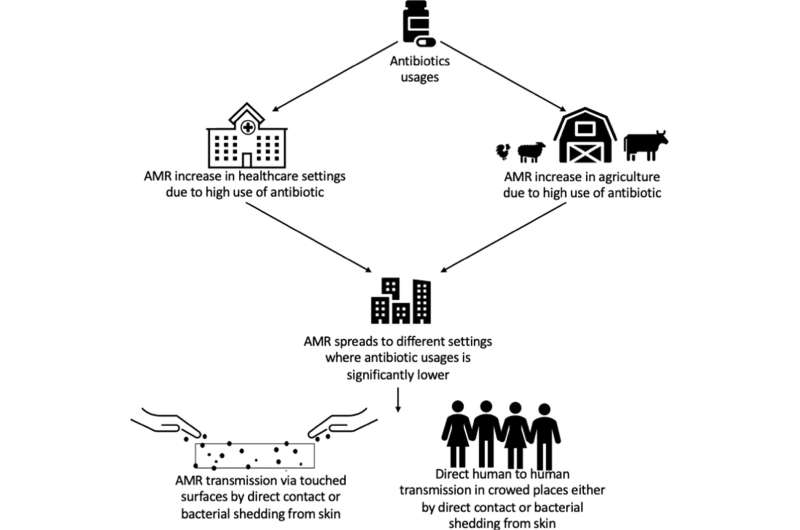
Making recommendations for change, academics from UWL’s School of Biomedical Sciences and Royal Holloway’s Department of Health Studies, analyzed global data into the prevalence of antimicrobial resistance (AMR) in urban areas—the rise of which is threatening the lifesaving role of the medications.
It is estimated that without intervention, by 2050, 10 million people worldwide could die annually from infections that no longer respond to antibiotics. And resistant bacteria are spreading everywhere from university campuses, leisure facilities, and transport hubs to the handles of shopping baskets and even in air samples—predominantly in areas of high human density and on frequently touched surfaces.
But despite the risk, very little surveillance has been carried out into the problems outside of wastewater and healthcare settings.
The report, “Surveillance and prevalence of antimicrobial resistant bacteria from public settings within urban built environments: Challenges and opportunities for hygiene and infection control,” published in Environment International, seeks to identify the prevalence and surveillance of the bacteria globally, making recommendations for change and improvements to fight the threat.
Researchers highlight the benefits of using technology to monitor AMR spread, designing urban spaces with public health in mind such as more hygienic transport systems.
And that this, alongside keeping up with good hand hygiene and infection control adopted during the COVID-19 pandemic, could drastically reduce transmission of AMR and other infectious diseases.
Dr. Jennifer Cole, lecturer in global and planetary health in the Department of Health Studies at Royal Holloway, said: “This study shows the importance of not letting the greater emphasis on hygiene and infection control we’ve become used to during COVID-19 slip, as it is just as valuable at preventing flu and the bacteria that cause colds and sore throats too.
“Putting the science and social science together in this way is a great example of how working across disciplines can improve our understanding and help to deliver workable solutions. Hand-gel dispensers on buses could make a huge difference to the spread of typical winter colds and flu.”
Professor Hermine Mkrtchyan, Professor of Microbiology and lead researcher on the paper, said: “Infection control is incredibly important especially during a pandemic, and we must be able to provide appropriate hygiene measures to avoid transmission whether its virus or bacteria.
“We know, as seen with COVID, that transmission risks increase when surfaces are not sanitized regularly and are touched multiple times a day, particularly by people with poor hand hygiene.
“So it is no surprise that within overcrowded public settings, AMR bacteria are being transmitted directly either via the air through shedding of skin, by direct contact, or through food.
“Long-term social distancing could go a long way in making lasting change and is incredibly easy to adopt. Additionally, with more robust data we can monitor the need for lasting targeted hygiene interventions such as the permanent introduction of hand sanitizing on transport and in busy areas.
Source: Read Full Article
